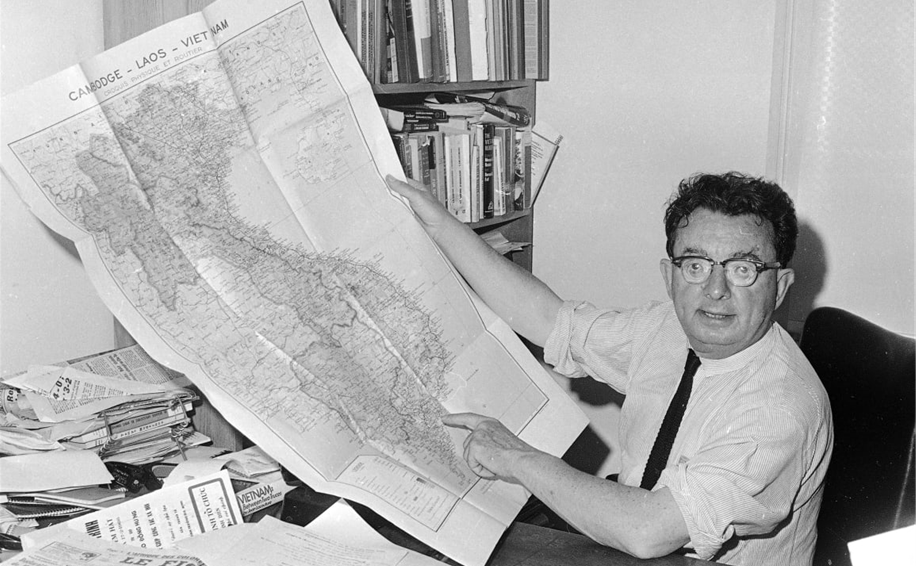David Jackson joined Better Government Association as a senior investigative reporter in August 2020 after nearly two decades of working as an investigative reporter at the Chicago Tribune. He is a winner of the 2022 Izzy Award, where he gave these insightful remarks on the history of I.F. Stone and state of journalism today.
Self-published journalist I.F. Stone shook the world awake when he challenged America’s official explanation for the Vietnam War, the Gulf of Tonkin incident.
Izzy stood alone when he revealed the racist questions in FBI recruitment material.
And he scorched the compliant D.C. press corps for serving as the scribes of government lies.
“I made no claims to ‘inside stuff,’” Stone said in one interview. “I tried to give information which could be documented, so the reader could check it for himself.”
Today local news outlets are sold for scraps by hedge funds and national media brands are losing public trust. And readers are following journalists in the model of IF Stone, who scoured the small type in the Congressional Record for truths the D.C. press corps couldn’t be bothered to find.
But remember: Izzy didn’t set out to be self-published.
He was blacklisted during the McCarthy era for his involvement with the League of American Writers and the Socialist Party of America, and he was bounced from leading U.S. papers after disputes with editors, then excluded from White House press conferences.
I take no side in the history of Isidor Feinstein Stone.
But I stand among the wave of investigative reporters who now work outside established newsrooms and build independent news outlets modeled after Izzy’s.
I.F. Stone’s life is a reminder that all reporters must rise to the urgent needs of their day, and none of us can expect once-bright media beacons to guide our steps.
The Chicago Tribune was thick in the weave of American democracy when I joined the paper in 1991 and for three decades I embraced the crackle and hum of a bustling metro daily.
Our civic mission was nested in a for-profit corporation and we knew we were beholden to the quarters readers dropped in honor boxes, the demands of shareholders, the disruptions of big tech and a clown car of bone-headed corporate bosses.
But on my desk every day were letters from readers who felt they had nowhere else to turn.
When the hedge fund Alden Global Capital dug its claws into Tribune Publishing in 2020, I worked with fellow reporter Gary Marx and others to find a civic-minded owner for newsrooms like ours in cities and small towns across America. Our quest was mirrored by efforts across the U.S.
We researched Alden, sought meetings with the hedge fund’s founders and put our careers on the line to publicly ask for help.
We lost that campaign. Badly.
Today Alden is the second largest owner of local and regional newspapers in the U.S.
As Alden executives buy mansions in Coconut Grove and East Hampton, their hedge fund has drained the Trib and 200 affiliated news outlets of assets and talent.
The remaining reporters heroically publish local news while the hedge fund sells off the buildings beneath their feet.
And we, Izzy’s children and grandchildren, still use real-world tools to dig out information that serves the public.
We listen to victims of injustice and violence. File legal demands that open government records. Mine big datasets. Tap confidential sources. Crack official conspiracies. Bear witness in the face of death.
We watch the world with unblinking eyes and we help the new generation of journalists coming up.
Print dailies sat on kitchen tables every day because grandma trusted the test kitchen recipes, grandpa studied the sports agate and each of us kids favored our own cartoon. And, oh yeah, those dailies reported big news and were marvelous to read.
Print banners tatter and fade, and the trust they held has not been instantly reconstituted by feisty nonprofits, glorious as some are.
I believe the future of reporting belongs to newsrooms modeled after the example of I.F. Stone.
Izzy was not cherished because he had a ready quip and great hair, or because he was independent.
Americans came to trust I.F. Stone’s blockbuster reports because on every page he spelled out his standards of transparency, accuracy, and public service.
Izzy built that trust word by word.
Check it yourself.
Image by William J. Smith

